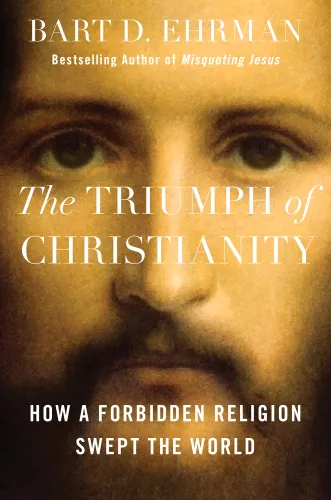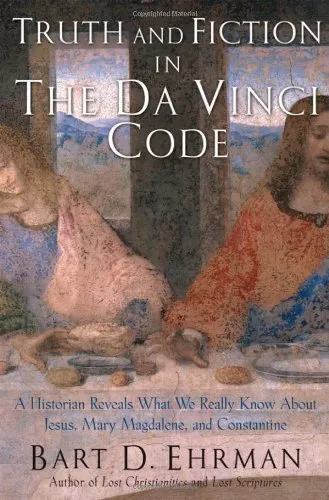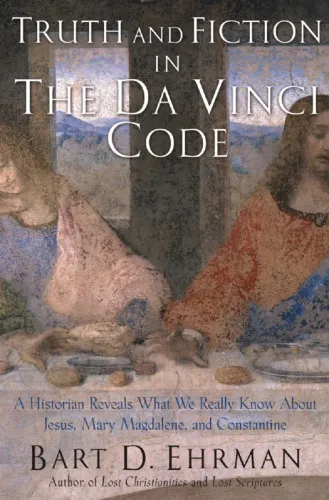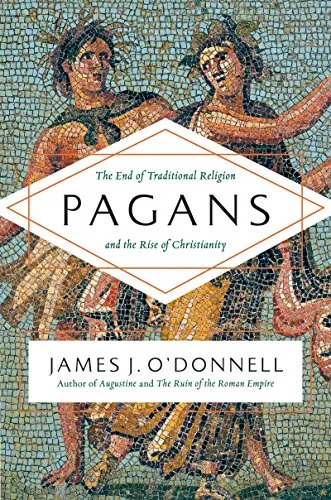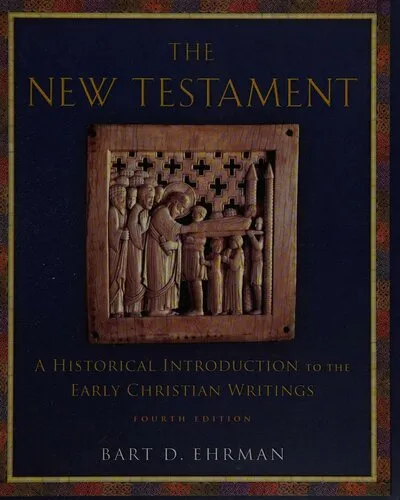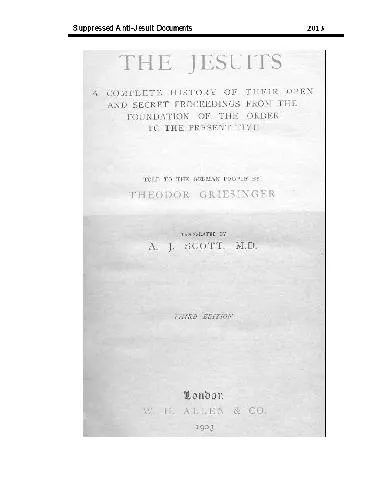The Triumph of Christianity: How a Forbidden Religion Swept the World
4.5
بر اساس نظر کاربران

شما میتونید سوالاتتون در باره کتاب رو از هوش مصنوعیش بعد از ورود بپرسید
هر دانلود یا پرسش از هوش مصنوعی 2 امتیاز لازم دارد، برای بدست آوردن امتیاز رایگان، به صفحه ی راهنمای امتیازات سر بزنید و یک سری کار ارزشمند انجام بدینکتاب های مرتبط:
مقدمهای بر کتاب 'The Triumph of Christianity: How a Forbidden Religion Swept the World'
کتاب 'The Triumph of Christianity: How a Forbidden Religion Swept the World' نوشته بارت دی. ارمان، روایتی جامع و دقیق از تاریخ مسیحیت است و به بررسی چگونگی فراگیر شدن دینی که در ابتدا ممنوع بود میپردازد. ارمان با عمق دانش و پژوهشی وسیع در تاریخ، فلسفه و جامعهشناسی، به تحلیل عواملی میپردازد که موجب گسترش و موفقیت این دین شدهاند. این کتاب سفرنامهای است از آغاز ظهور مسیحیت در سرزمینهای کوچک یهودی تا به دست گرفتن قدرت در امپراتوری روم.
خلاصهای از کتاب
بارت ارمان در این کتاب به بررسی دقیق چگونگی تحول مسیحیت از یک دین یهودی حاشیهنشین به یک قدرت مسلط در امپراتوری روم میپردازد. او توضیح میدهد که این تحول نباید به سادگی به تغییرات تصادفی یا نیات الوهی نسبت داده شود بلکه ناشی از یک سری عوامل اجتماعی، سیاسی و فرهنگی بوده است. نگارنده با استفاده از منابع متنی تاریخی و تحقیقات مدرن، داستانی جذاب و پرچالش را ارائه میدهد که نه تنها برای علاقهمندان به تاریخ، بلکه برای هر کسی که به فهم عمیقتر از جوامع بشری و چگونگی شکلگیری و تحولات آنها علاقه دارد، مفید است.
یادگیریهای کلیدی
- اهمیت عامل سیاسی و همراستا شدن مسیحیت با منافع قدرتهای حاکم در گسترش این دین.
- نقش فیلسوفان و متفکران اوایل مسیحی در هموار کردن مسیر تفکر دینی و همسانسازی آن با فلسفه یونانی.
- تأثیر شبکههای اجتماعی و ارتباطی در اوایل دوره مسیحی بر رشد سریع این دین.
جملات معروف کتاب
"تاریخ مسیحیت، داستانی از پیروزی ایمان بر قدرت نیست بلکه همراستایی قدرتهای دنیوی با باورهای دینی است."
"هرچند که مسیحیت در ابتدا دینی محدود باقی مانده بود، اما توانست زبانی جهانی پیدا کند که برای تمامی افراد در زمان مناسب جذاب باشد."
چرا این کتاب مهم است؟
'The Triumph of Christianity' به عنوان یک اثر پژوهشی جامع، چرایی و چگونگی تحول تاریخی یکی از مهمترین ادیان جهان را به شیوهای روشنگرانه بررسی میکند. مخاطبان کتاب، علاوه بر یادگیری تاریخ مسیحیت، دیدی عمیقتر به تاریخ تمدن بشری و تعاملات پیچیده بین فرهنگها، سیاستها و باورها خواهند یافت. این اثر، به دلیل تحلیلهای دقیق و دسترسی به منابع متعدد و معتبر، به عنوان یکی از منابع کلیدی برای پژوهشهای تاریخی شناخته شده و به درک بهتر از تاثیرات دین بر جوامع بشری کمک میکند.
Introduction to "The Triumph of Christianity: How a Forbidden Religion Swept the World"
Bart D. Ehrman's "The Triumph of Christianity: How a Forbidden Religion Swept the World" delves into one of the most fascinating transitions in the history of religion: the rise of Christianity from a small, obscure sect to a powerful faith that shaped the Western world. This book endeavors to unravel the complexities behind this transformational ascent, dissecting historical events, socio-political influences, and theological shifts that contributed to Christianity's monumental rise.
Detailed Summary of the Book
The book spans the initial emergence of Christianity within the Roman Empire, a time when the belief was considered treacherous and its followers persecuted. Starting with the life and teachings of Jesus, Ehrman examines how Christianity appealed to a diverse demographic, cutting across class, gender, and ethnic lines. The initial chapters explore the missionary journeys of key figures like the Apostle Paul and how the Christian message spread through these concerted and often dangerous efforts.
Further into the narrative, Ehrman analyzes the socio-political and cultural landscapes that affected this rapid expansion. He scrutinizes how Constantine’s conversion and the subsequent Edict of Milan decriminalized the faith, leading to profound changes in how Christianity was perceived and practiced. The book discusses the ensuing theological debates and councils that sought to define orthodoxy, laying the groundwork for what would become institutionalized Christianity.
By highlighting lesser-known figures and lesser-examined catalysts of growth, Ehrman provides a comprehensive look at Christianity’s reach and adaptation across different territories and epochs. His methodical examination offers readers a nuanced perspective, resisting the temptation to oversimplify the story into one of mere divine inevitability. Instead, it is a testament to strategic human decisions and a reshaping of beliefs tailored to resonate with various peoples and cultures across time.
Key Takeaways
- The growth of Christianity was not just a religious phenomenon but also deeply intertwined with the political, social, and economic changes within the Roman Empire.
- Conversion to Christianity involved not only personal religious experiences but also strategic social alliances and adaptations.
- The shift from persecution to acceptance under Constantine was a pivotal moment that greatly accelerated Christianity’s rise.
- Christianity's emphasis on inclusivity and universality played a significant role in its widespread appeal and eventual dominance.
- Ehrman dispels the myth of God's direct intervention as the primary reason for Christianity's success, emphasizing human agency and historical context instead.
Famous Quotes from the Book
"The triumph of Christianity was not primarily about the number of its adherents but about the implications for culture, life, and governance throughout the world."
"Christianity did not rise because it offered a new nihilistic vision or merely because it showed the flaws of Roman polytheism, but because it provided a community, a sense of belonging, and a way of seeing the world that was hard, if not impossible, to resist for many."
Why This Book Matters
"The Triumph of Christianity" is crucial for understanding how historical, cultural, and individual factors drive religious transformations. Ehrman’s scholarship provides insight into how Christianity reshaped prevailing social norms and power dynamics, ultimately influencing the spiritual and temporal worlds profoundly. This book does not just cater to historians or religious scholars but offers valuable lessons for modern readers seeking to comprehend how ideas and beliefs can radically change human societies.
Furthermore, Ehrman’s work challenges readers to consider the active human role in religious change, encouraging a deeper appreciation of history as a tapestry woven not just by divine decree but by human hands and hearts. As religions continue to alter lives globally, understanding such monumental shifts in history remains more relevant than ever.
دانلود رایگان مستقیم
شما میتونید سوالاتتون در باره کتاب رو از هوش مصنوعیش بعد از ورود بپرسید
دسترسی به کتابها از طریق پلتفرمهای قانونی و کتابخانههای عمومی نه تنها از حقوق نویسندگان و ناشران حمایت میکند، بلکه به پایداری فرهنگ کتابخوانی نیز کمک میرساند. پیش از دانلود، لحظهای به بررسی این گزینهها فکر کنید.
این کتاب رو در پلتفرم های دیگه ببینید
WorldCat به شما کمک میکنه تا کتاب ها رو در کتابخانه های سراسر دنیا پیدا کنید
امتیازها، نظرات تخصصی و صحبت ها درباره کتاب را در Goodreads ببینید
کتابهای کمیاب یا دست دوم را در AbeBooks پیدا کنید و بخرید
1627
بازدید4.5
امتیاز0
نظر98%
رضایتنظرات:
4.5
بر اساس 0 نظر کاربران
Questions & Answers
Ask questions about this book or help others by answering
No questions yet. Be the first to ask!
